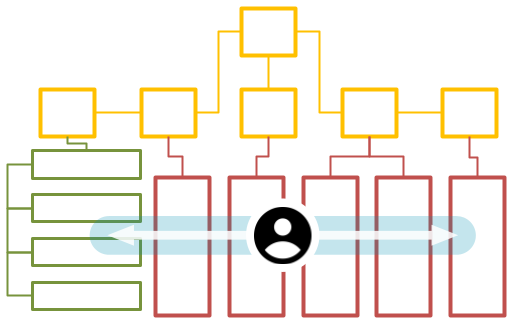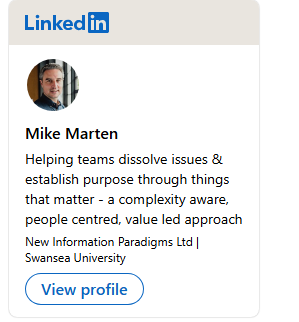Change Champion Profile
A Change Champion is one of three roles we’ve identified as being critical in change initiatives.

A Change Champion is a versatile, frontline professional, experienced in various roles like project management, business development, and change management. They are a proactive problem-solver and an influential communicator, adept at identifying organisational needs and initiating innovative solutions. Despite not necessarily being in senior leadership, their network-building skills and deep organisational understanding enable them to drive change. However, they often face challenges like lack of recognition, job insecurity, and resistance to change, but remain committed and resilient in their pursuit of impact and improvement.
A Change Champion:
is vision and goal-oriented
Understands the organisation’s needs and goals: Has a deep sense of the organisation’s needs and goals, usually backed up by an understanding of why these needs and goals exist, and can identify where things aren’t as they should be or where opportunities lie.
Recognises the need for change: Recognises where change needs to happen and what good would (realistically) look like.
Discerning Idea Generator: Discerning when it comes to identifying promising new ideas, approaches, and tools.
influences and communicates clearly
Respected and Insightful: Is recognised as insightful and in touch with what’s really going on, and is worth listening to.
Enthusiastic and Clear Communicator: Exhibits enthusiastic, compelling, clear, and ‘audience’-focused communication.
builds trust and relationships
Strong Networker: Has strong interpersonal, networking, and collaborative skills, which help recruit, involve and carry others along. Actively looks for those of a sympathetic mind higher up and/or more experienced in the organisation that have clout and resources to authorise change.
Collaborative Relationship Builder: Cultivates relationships, and convenes, coordinates with, and collaborates with cross-boundary and cross-organisational teams, often involving workshops, training, or coaching.
is resilient and adaptable
Passionate and Driven: Exhibits passion, drive, and responsibility.
Adaptive and Proactive: Is proactive, creative, and adaptive, proposing ideas and building rapport and trust to facilitate cooperation and collaboration.
is a proactive problem solver
Solution-Focused and Practical: Is focused on solutions and actions, prioritises problem-solving, practicality, cost-effectiveness, and achievability to deliver tangible results.
manages and organises
Committed and Responsible: Is committed to success to the point of going above and beyond what their job strictly entails.
Innovation-focused: May be specifically tasked with innovation, internal consultancy, etc. Is willing to develop “skunkworks”, lead special project teams and run pilots as proof of concept.
Organisational Analyst: Measures, analyses, and diagnoses organisational strengths, weaknesses, and opportunities.
is culturally sensitive and diplomatic
Trendspotter: Takes an interest in, researches, and identifies emerging trends and technologies (e.g., will be looking to see how to most effectively use ChatGPT).
Change Facilitator: Works to facilitate change, looking out for potential partnerships, both internal and external.
has versatility and front-line experience
Versatile Role: May be a project or programme manager or in business development, change management, and other ‘horizontals’ (marketing, R&D, operations, QA). Often doesn’t have a natural or fixed ‘home’ in the organisation, working across or moving between organisational departments and levels.
Front-Line Experience: Nearly always has front-line experience, even if relatively early in their career, and generally less inclined to accept a role in senior leadership.
Influential, Yet Dependent on Authorisation: Actively drives initiatives through expertise and force of personality, yet relies on others for resource authorisation and access due to their position in the organisation.
Role in the conventional organisation:

A Change Champion:
- nearly always has front line experience, even if relatively early in their career, and is generally less likely to be in senior leadership.
- may be a project or programme manager or in business development, change management, and other ‘horizontals’ (marketing, R&D, operations, QA).
- may be specifically tasked with innovation, internal consultancy, etc.
- often doesn’t have a natural or fixed ‘home’ in the organisation, working across or moving between organisational departments and levels.
- has a deep sense of the organisation’s needs and goals – usually backed up by an understanding of why these needs and goals exist – and can identify where things aren’t as they should be or where opportunities lie.
- doesn’t usually have the ‘clout’ to drive things themselves, or at least to the extent that they’d like.
Perspectives on, and challenges arising from Change
Questions they may ask themselves in Change situations
Why don’t people understand the need for change?
How can I secure the necessary resources and support from management?
How can I extend my influence beyond my individual capacity?
How can I demonstrate my value without attracting unwanted scrutiny or putting myself at risk?
What impact will AI and other technological advances have on my role and the organisation?
How can I clearly articulate the value I bring to the organisation?
How can I foster a culture of change and innovation within the organisation?
How can I best handle resistance to change from colleagues or superiors?
How can I stay updated on industry trends and incorporate them into my change strategies?
How can I ensure that the changes I advocate for are sustainable and have long-term value?
How do I ensure that my ideas are not only heard but also implemented?
Reasonable Expectations in Change situations
Unified leadership and workforce: Expect that both the leadership team and the workforce should be aligned and working towards the same goals.
Valuing diversity: Expect that individual differences contribute positively to the organisation, provided everyone is united by a common purpose.
Recognition of best practices: Believe that best practices, once identified and communicated, will be recognised and adopted by others.
Innate drive to do right: Trust that people inherently want to make the right decisions and improve, even if they are not yet aware of the best course of action.
Openness to change: Assume that colleagues will be open to change and willing to adapt to new ways of working.
Acknowledgment of efforts: Expect that their efforts and achievements in driving change will be acknowledged and rewarded.
Availability of resources: Anticipate that necessary resources and support for implementing change will be provided.
Positive impact: Expect that their work will lead to positive changes in the organisation and contribute to its long-term success.
Continuous learning: Believe in the organisation’s capacity for continuous learning and improvement.
Roadblocks to progress in Change situations
Functional silos: Organisational structures that impede cross-departmental collaboration can hinder change champions’ efforts.
Limited authority: Despite their role, change champions often lack the formal authority needed to enact certain changes or decision-making power.
People-centric issues: Every individual is unique and managing change often requires understanding and catering to a variety of personalities, which can be challenging.
Restricted presence: As one person, a change champion can’t be everywhere at once, which could limit their influence and oversight.
Limited reach: There may be difficulty accessing and influencing individuals beyond their immediate circle or current project area.
Measurement of success: The success of a change champion is often intangible and challenging to quantify, making it difficult to demonstrate their value.
Resistance to change: Change often triggers discomfort or fear, leading to resistance from colleagues or superiors.
Resource constraints: Lack of adequate resources such as time, budget, or manpower can hinder the change process.
Communication barriers: Ensuring clear, effective communication of new ideas or strategies across different levels of the organisation can be a significant challenge.
Rapid organisational or market changes: Change champions must constantly adapt to new developments, which can be demanding and create additional roadblocks.
Types of Problem that may be encountered in Change situations
Tangible results: Desire to witness and contribute to concrete results that they’ve had a direct role in achieving.
Recognition: Crave acknowledgement for their actions and the positive changes they’ve brought about.
Engaging work: Desire to focus more on the enjoyable, challenging aspects of their job and less on mundane tasks.
Greater empathy: Aspire for increased empathy and understanding among workforce and leaders about the values, issues, and dynamics at play.
Trusted advisor: Desire to be a reliable and trusted source of advice for their peers, leaders, and other stakeholders.
Lack of recognition or support from management: This could be due to management’s need for tangible evidence before investing in change or simply a refusal to listen to new ideas.
Conflicting directives: Navigating contradictory or competing orders from above can create confusion and hinder progress.
Job insecurity: The position of a change champion might not be formally recognised, leading to job insecurity. Furthermore, the role might be evolving, adding to the uncertainty.
Misunderstanding from colleagues: Colleagues overwhelmed by their workloads may perceive change champions as meddling or overly idealistic, rather than seeing them as helpful.
Dependence on volatile conditions: Their influence can often depend on crises that require their expertise or on sponsors who might not stay long-term.
Constant job hunt: Due to their unique role, change champions may always have to be on the lookout for their next project or opportunity, both within and outside the organisation.
Repetitive narratives: Hearing and processing the same objections, fears, or concerns from different people can become draining and may lead to feelings of stagnation.
Scaling challenges: The effective strategies they develop may be difficult to scale, turning each implementation into a battle.
Limited coping strategies: When faced with resistance or failure, change champions often lack viable options beyond resignation, denial, doubling down on their efforts, or resorting to shortcuts.
Difficulty measuring impact: Change is often intangible and takes time, making it challenging to prove the value and impact of their work to others, which ties back to the need for management’s tangible evidence. Common Fears emerging in Change situations
Job security: Fear of being marginalised or dismissed due to being seen as a maverick or because their role is considered expendable in the organisation.
Losing touch with action: The fear of being stuck in a routine desk job or a role that’s far removed from the dynamic, problem-solving aspects of their work.
Loss of autonomy: The fear of having to wait for directives when they already have a clear understanding of what needs to be done.
Job redundancy: The fear of doing such a good job in implementing changes that their own role becomes unnecessary or redundant.
Being overshadowed: The fear of being sidelined by a new intervention, external consultancy, or a favoured troubleshooter who might gain preference.
Replacement by AI/technology: The fear of being replaced as technology advances, particularly as AI becomes more sophisticated and capable.
Resistance to change: Fear of encountering severe resistance or negative reactions from colleagues or superiors when proposing or implementing changes.
Ineffectiveness: Fear that their efforts may not result in the desired change or may not be recognised or appreciated.
Burnout: The fear of physical and emotional exhaustion due to the high level of commitment, passion and workload that comes with driving change.
Falling behind: Fear of being unable to keep up with industry trends, innovations, and the fast-paced evolution of their role.
Motivating Desires in Change situations
Expanding networks: Wish to broaden their network both within and outside the organisation, allowing them to learn and leverage various opportunities.
Professional growth: Aspire to continually learn, grow, and develop in their career, taking on larger, more complex projects and challenges.
Influence: Desire to have a significant influence on the direction and culture of the organisation, driving it towards continuous improvement.
Job security: Aspire for a secure position within the organisation, where their role as a change champion is valued and recognised.
Innovation: Have a keen interest in leveraging the latest trends, technologies, and tools to drive change within the organisation.

